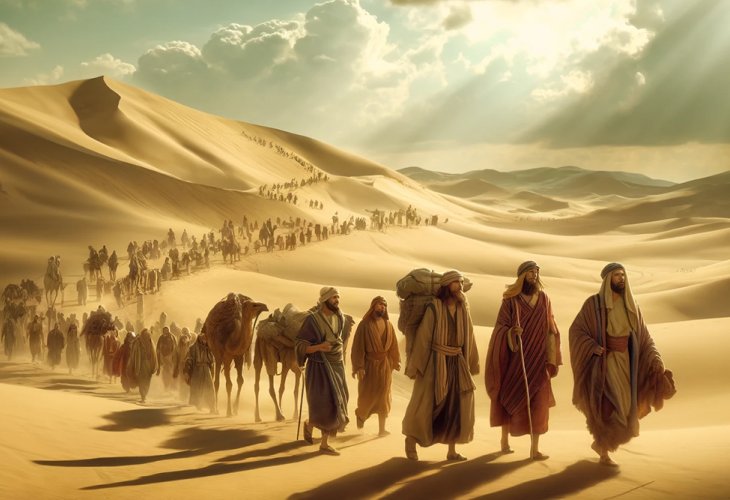Issues in the Bible
Why Did the Israelites Want to Return to Egypt? The Psychology of Faith in the Desert
The generation of the Exodus faced not only physical trials but a deep spiritual test — learning to trade the comfort of control for the courage of faith

The journey of the Israelites from Egypt to the Land of Israel is one of the most central and powerful stories in the entire Exodus narrative. Throughout their travels in the wilderness, the people faced numerous challenges and tests, but surprisingly, whenever they encountered hardship, their immediate instinct was the desire to return to Egypt.
Why? How could they possibly want to go back to slavery — to the place of their suffering and humiliation? How could they forget the bitter years of bondage so quickly?
The Paradox of the Desert Generation
This question repeats itself throughout the story of the Exodus. It seems that every time things became even slightly difficult, the Israelites longed to return to Egypt.
How could they lose faith after witnessing such overwhelming miracles including the Ten Plagues, the splitting of the Red Sea, the manna from heaven, and the giving of the Torah? After witnessing how God runs the world, shouldn’t their faith have been unshakable? Shouldn’t they have been able to trust Him even through trials?
Life in the Desert: Total Dependence on God
To understand the Israelites, we must understand their mental and emotional state during those years in the desert.
In the wilderness, they did not need to fend for themselves at all.
Every wish was met directly by God: their clothes did not wear out, food descended daily from heaven, and water miraculously flowed from a rock.
At first glance, this seems like the ideal situation — freedom from material worries, and allowing total focus on spirituality and Torah.
In reality however, it was an extremely uncertain and fragile existence.
Just as the manna could appear out of nowhere, it could just as easily stop. Human beings are wired to feel secure through physical effort such as plowing, building, and saving, as these create a sense of control and safety. The Israelites had no such outlet.
Their only source of security was faith — complete trust that God would provide again tomorrow. Every day they needed to ask themselves: Are we still worthy of manna from heaven? Will the water flow again? This required immense spiritual strength.
When they were in a situation when no water flowed from the rock, panic set in. They feared that they had fallen from grace, and that they were no longer worthy of the miracles sustaining them. And so they longed for Egypt — not because they missed slavery, but because Egypt represented certainty.
In Egypt, life was hard, but predictable. They worked, they ate. They suffered, but they had control. Better a life of harsh certainty than one of constant dependence on the unseen.
The Sin of Moshe and Aaron
Rashi explains that when Moshe first struck the rock, only a few drops of water trickled out. Seeing this, Moshe and Aaron struck it again, after which the waters gushed forth in abundance. The water did not flow because of the physical blow, but because of God’s command.
By striking the rock again, Moshe and Aaron gave the impression
that the physical act of hitting the rock, was what caused the water to flow. They turned a divine miracle into what looked like a natural mechanism, of cause-and-effect in the material world.
God therefore said: “Because you did not believe in Me to sanctify Me before the eyes of the Israelites…” (Bamidbar 20:12)
Instead of elevating the people’s awareness and demonstrating that physical reality depends entirely on divine command, Moshe and Aaron inadvertently reinforced the illusion that material actions produce material results.
The Fiery Serpents and the Struggle with Faith
Later in the same Torah portion, the people again complain about the lack of water, and again they express the wish to return to Egypt. This time, however, the punishment is severe, and God sends among them the fiery serpents (nechashim seraphim).
Even at their high spiritual level, the Israelites still found it difficult to let go of their attachment to the physical world, the comfort of cause and effect, and the illusion of control.
The “fiery serpents” symbolize the burning anxiety that arises when one must live entirely by faith, without material certainty to lean on.
Understanding Their Fear
It’s easy to judge the Israelites for their constant complaints, but perhaps now we can understand them more compassionately.
They were being asked to live in a completely new spiritual reality; to step out of the normal human instinct for security and to trust in God for everything, every single day. That is a level of faith that even the greatest struggle to sustain.
Their longing for Egypt was not just nostalgia for a homeland, but a human yearning for stability in a life ruled by uncertainty. And yet, through those struggles, they slowly learned — as we all must, that true security lies not in control, but in trusting the One who sustains all things.

